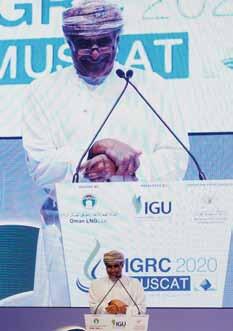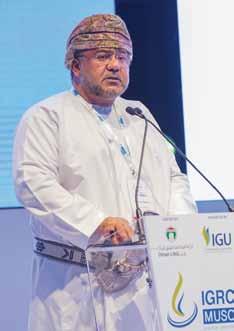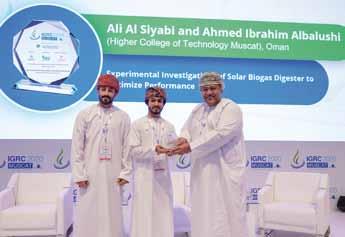
9 minute read
IGRC2020: Overcoming the challenges
IGRC2020: Overco the challenges ming
While other international conferences have been cancelled in the wake of the coronavirus pandemic, IGRC2020 was successfully held in Muscat, Oman in February. By Hisataka Yakabe
On February 26, the 16th IGU Research Conference came to a close, following a last-minute reorganisation of the programme to ensure the success of the three-day event in the face of the international health crisis.
As IGU President, Professor JM (Joe) Kang, said: “I would like to extend my gratitude to the Sultanate of Oman and Oman LNG for successfully hosting this event, as well as to all the participating individuals and companies. We have seen a great attendance from all over the globe, despite the current world circumstances; as such we thank everyone who made an effort to create, attend, and be part of this event, and look forward towards creating more groundbreaking research in the gas industry.”
Hundreds of participants from 34 countries took part in IGRC2020, which was held at the Oman Convention and Exhibition Centre in Muscat, to discuss the latest developments in gas research and innovation. It was hosted by IGU Charter Member Oman LNG under the patronage of Oman’s Ministry of Oil and Gas. This was the first time IGRC had been held in the Middle East.
The theme of IGRC2020 was “Gas Innovations for a Sustainable Future”, giving a clear message that innovative technologies related to natural gas have an important role to play in meeting the challenges of global warming and ensuring a sustainable future.
Oman’s Minister of Oil and Gas, HE Dr Mohammed bin Hamad Al Rumhi,


HE Dr Mohammed bin Hamad al Rumhi, Oman’s Minister of Oil and Gas (left), Prof. JM (Joe) Kang, IGU President (centre) and Khalid bin Abdullah Al Massan, CEO of Oman LNG Development Foundation (right), addressing the opening ceremony.
v Harib Al Kitani, CEO of Oman LNG, welcomes delegates to the Gala Dinner.
x Luis Bertrán Rafecas, IGU Secretary General, with HE Salim Al Aufi, Undersecretary in Oman’s Ministry of Oil and Gas.



opened the conference and in his speech declared, “We are here to solve the sustainability problem and natural gas is part of the solution”. Also speaking during the opening ceremony were Khalid bin Abdullah Al Massan, CEO of Oman LNG Development Foundation and Chair of the National Organising Committee, Harib Al Kitani, CEO of Oman LNG, Professor JM (Joe) Kang and myself.
Programme
It was my great pleasure to manage the programme of IGRC2020, and also a
IGRC2020 Sponsors
c Andrea Stegher, IGU’s Regional Coordinator for Europe, during one of the Q&As.
x Briefing delegates during a poster session.
great honour and privilege to have
Local Host & Gala Dinner Sponsor: Platinum Sponsor: Strategic Partner:
Welcome Reception Sponsor: Gold Sponsor: Gold Sponsor: Technology Partner: Shipping Partner: Silver Sponsor: Silver Sponsor: Bronze Sponsor: Bronze Sponsor: Oman LNG OQ Petroleum Development Oman BP Oman Shell Oman Qatargas Baker Hughes Oman Shipping Company Total EP Gas Technology Institute Mitsubishi Corporation KBR
welcomed participants who came from all over the world to the conference. I and the entire R&D and Innovation Committee of IGU would like to express our sincere gratitude to the Omani organisers and all supporting staff for their hospitality and hard work in organising the conference. We are also very grateful to the sponsors (see box).
After the outbreak of coronavirus, our Chinese colleagues decided not to attend the conference in a bid to rea

ssure delegates from other countries. This necessitated a rework of the programme to fill the gaps left by the absence of Chinese speakers and moderators. As the situation developed, some companies imposed a blanket ban on travel and we had more gaps to fill. However, everyone involved worked hard to fill the sessions to ensure that they were interesting and stimulating.
Overall, 82 speakers from 18 countries gave oral presentations, while there were 96 poster panels from 14 countries. Our excellent moderators facilitated discussions and delegates made valuable contributions in the Q&As.
In addition to the established oral, workshop and poster sessions of previous IGRCs, the technical programme included new special sessions. These focused on six strategic topics: working towards a cleaner world; coupling gas and electrical systems; decarbonisation; hydrogen;
the measurement and reduction of methane emissions; and renewable natural gas.
Topics of particular interest to participants included the 3Ds: decarbonisation, digitisation and decentralisation. These increasingly important issues were examined and discussed in depth at IGRC2020.

z IGRC2020 was held in the Oman Convention and Exhibition Centre.

x Visitors to the OQ stand in the exhibition. Decarbonisation was the overriding concern for many participants and a lot of heated discussions on this theme captivated audiences.
One impressive feature of IGRC2020 was the invigorating contribution of presenters and delegates from the host country. Experts from the Omani gas industry presented state-of-theart technologies relevant to the LNG business and the latest developments

in digital technologies, while many Omani college students used the opportunity of the poster sessions to present the results of their research and discuss them with international experts. To stimulate and encourage young local scientists is another important purpose of the IGRCs.
Awards
Thanks to the hospitality of the organisers and Petroleum Development Oman, we were able to make four awards to encourage young scientists and to recognise promising research and development in the gas industry. Members of the R&D and Innovation Committee selected the winners and the awards were made during the closing ceremony.

Winner of the award for the best oral paper with a prize of $1,500 was Sander Gersen of DNV GL, whose presentation was on hydrogen as a fuel for heating processes.
There were three non-monetary awards for posters presented by young (under 35) researchers.
In the upstream category, Ali Al Siyabi and Ahmed Ibrahim Albalushi of the Muscat Higher College of


Technology were recognised for their experimental investigation of a solar biogas digester to optimise performance.
In the downstream category, Naoyuki Kato of Toho Gas was recognised for his development of the trenchless Stream method to replace castiron pipes with polyethylene pipes.
In the cross-cutting technologies category, a team led by Amélie Louvat of the Research and Innovation Centre
c Ali Al Siyabi and Ahmed Ibrahim Albalushi are presented with their award by Khalid bin Abdullah Al Massan. c Sander Gersen, winner of the best oral paper award, flanked by Amélie Louvat (the crosscutting technologies award winner) and Naoyuki Kato (the downstream award winner). Further right are Ali Al Siyabi and Ahmed Ibrahim Albalushi (upstream award winners).
for Energy (RICE) at GRTgaz was recognised for the development of standardised methods for the analysis of ammonia, terpenes and amines in biomethane.
Looking ahead
The mission of the triennial IGRCs has been updated from one conference to the next, reflecting the current situation of the gas industry and R&D. The environment surrounding the gas industry is changing rapidly, the gas industry has to evolve and so does the IGU Research Conference. I greatly appreciate the engagement and participation of all delegates in IGRC2020 and IGRC2023 will build on what was achieved in Oman.
Hisataka Yakabe of Tokyo Gas is the Chair of IGU’s R&D and Innovation Committee.
NEWS
We start this issue’s news section with a report from the Regional Coordinator for Africa & the Middle East. Then the Members’ corner focus is on Switzerland’s
Swissgas. Next up are profiles of IGU’s new members followed by news from the Secretariat and a summary of the latest edition of IGU’s Urban Air Quality report. After the news section, we round off with an overview of IGU’s organisation, members and the events calendar.
The Total-led Mozambique LNG Project is moving forward at pace following the $20 billion Final Investment Decision (FID) made in June 2019.
The Project starting point was the discovery in 2010 of two deep water reservoirs in Area 1 of the Rovuma Basin off the coast of northern Mozambique, containing approximately 65 trillion cubic feet of recoverable natural gas. This resource base has propelled Mozambique into the top fifteen countries with recoverable gas. Moreover, it underpins the development of an initial two-train onshore greenfield LNG project of around 13 million tonnes of LNG per annum (MTPA) based on production from the Gulfino-Atum field. Natural gas from eighteen subsea production wells will be piped to shore over 40 kilometers away from where the LNG will be produced, stored, loaded and exported from the Afungi Peninsula. Longer term, the project has the potential to expand production up to 43 MTPA which is equivalent to about one sixth of the current worldwide LNG demand. The EPC Contractor (CCS JV) is mobilised on site and construction has commenced. The Project is scheduled to deliver its first production of LNG and condensate in 2024.
Mozambique’s geographical location is opportune as the Project is wellpositioned to meet the needs of LNG customers in the Atlantic and AsiaPacific markets and to tap into the growing demand for clean energy in other parts of the world including the Indian sub-continent. The Project successfully secured 11.14 MTPA in long-term sales to a diversified portfolio of credit-worthy customers comprising Tokyo Gas-Centrica (Japan-UK), Shell, JERA-CPC (Japan-Taiwan), CNOOC (China), Electricité de France (France), Pertamina (Indonesia), Bharat (India) and Tohoku Electric (Japan). Selling jointly on behalf of its partners on an ex-ship basis, the Project will deliver LNG from Mozambique to its customers by chartering a modern and efficient fleet of newbuild LNG carriers owned and operated by experienced shipowners.
The Project’s investment will be transformational for the people of Mozambique. We intend to award $2.5 billion worth of contracts to Mozambican owned or registered companies and hire approximately 5,000 local employees during the expected four-and-a-half-year construction period. When operational, the Project is expected to create around 1,500 direct long-term jobs for Mozambican workers. Furthermore, Mozambique LNG is committed to making natural gas available to the domestic market in phases to support the economic and social development of the country.
Total, as the Operator, holds a 26.5% participating interest along with six other partners including ENH (Empresa Nacional de Hidrocarbonetos), the National Oil Company of Mozambique (15%), Mitsui, one of the largest trading companies of Japan (20%), OVL, a wholly owned subsidiary of India’s largest oil and gas company ONGC (16%), Bharat Petroleum of India, which is engaged in refining, marketing and exploration and production (10%), PTTEP, the national E&P company of Thailand (8.5%) and Oil India, the second largest E&P company of India (4%).
Total is the second largest publicly held LNG company with an active presence across the full value chain from upstream production, liquefaction (with equity in 12 existing and 2 future projects), trading, shipping, regasification and ending with the marketing of natural gas to end-user customers. Combining its upstream and downstream activity in LNG, Total has developed a world market share of 10%. Total is active in 130 counties and is committed to better energy that is safer, more affordable, cleaner and accessible to as many people as possible. In Africa, Total is the leading energy player, operating in 43 different countries including Mozambique. LNG and Africa are central to Total’s strategy and growth.










